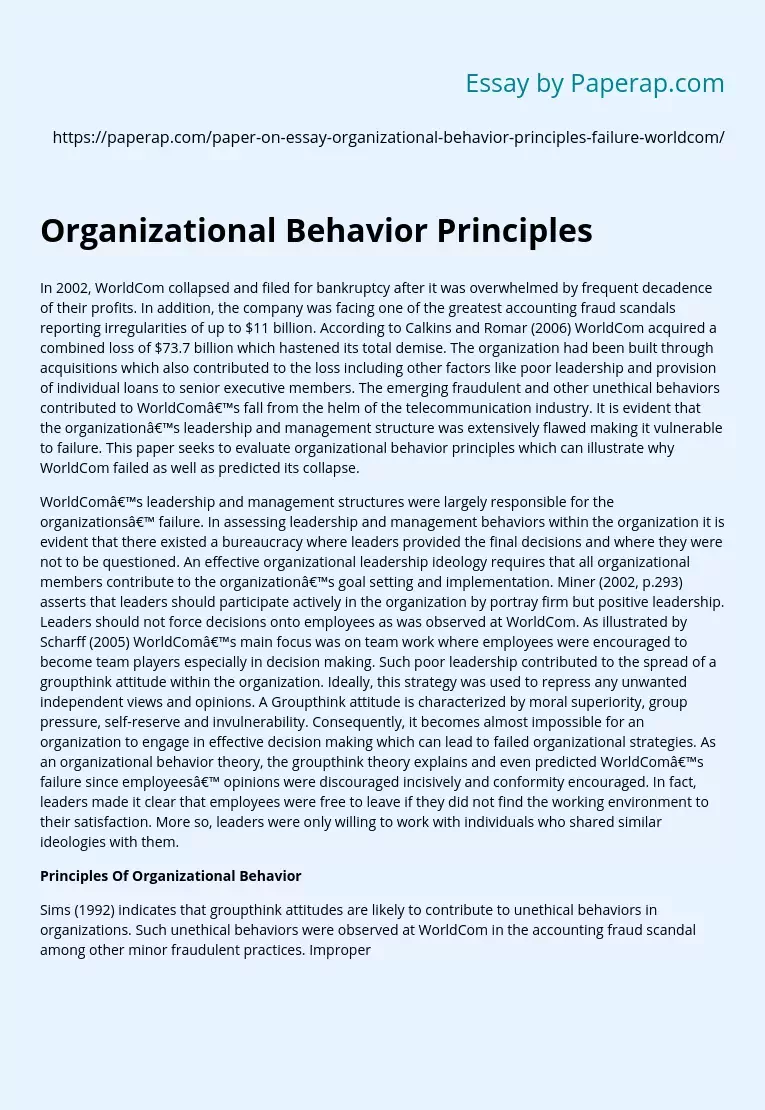Organizational Behavior Principles
In 2002, WorldCom collapsed and filed for bankruptcy after it was overwhelmed by frequent decadence of their profits. In addition, the company was facing one of the greatest accounting fraud scandals reporting irregularities of up to $11 billion. According to Calkins and Romar (2006) WorldCom acquired a combined loss of $73.7 billion which hastened its total demise. The organization had been built through acquisitions which also contributed to the loss including other factors like poor leadership and provision of individual loans to senior executive members.
The emerging fraudulent and other unethical behaviors contributed to WorldCom’s fall from the helm of the telecommunication industry. It is evident that the organization’s leadership and management structure was extensively flawed making it vulnerable to failure. This paper seeks to evaluate organizational behavior principles which can illustrate why WorldCom failed as well as predicted its collapse.
WorldCom’s leadership and management structures were largely responsible for the organizations’ failure. In assessing leadership and management behaviors within the organization it is evident that there existed a bureaucracy where leaders provided the final decisions and where they were not to be questioned.
An effective organizational leadership ideology requires that all organizational members contribute to the organization’s goal setting and implementation. Miner (2002, p.293) asserts that leaders should participate actively in the organization by portray firm but positive leadership. Leaders should not force decisions onto employees as was observed at WorldCom. As illustrated by Scharff (2005) WorldCom’s main focus was on team work where employees were encouraged to become team players especially in decision making.
Such poor leadership contributed to the spread of a groupthink attitude within the organization. Ideally, this strategy was used to repress any unwanted independent views and opinions. A Groupthink attitude is characterized by moral superiority, group pressure, self-reserve and invulnerability. Consequently, it becomes almost impossible for an organization to engage in effective decision making which can lead to failed organizational strategies. As an organizational behavior theory, the groupthink theory explains and even predicted WorldCom’s failure since employees’ opinions were discouraged incisively and conformity encouraged. In fact, leaders made it clear that employees were free to leave if they did not find the working environment to their satisfaction. More so, leaders were only willing to work with individuals who shared similar ideologies with them.
Principles Of Organizational Behavior
Sims (1992) indicates that groupthink attitudes are likely to contribute to unethical behaviors in organizations. Such unethical behaviors were observed at WorldCom in the accounting fraud scandal among other minor fraudulent practices. Improper conduct was being observed in most levels of the organization due to an entrenched culture of unethical behavior. In addition, the CEO was observed to submit falsified reports and also pressured executives and other employees to achieve their goals regardless of the means even using fraud. While under such stress it is highly probable that employees within an organization develop coping mechanisms which include negative and unethical practices. Such defenses developed by employees result to misjudging of critical warnings, failing to explore consequences of ambiguous events, misinterpretation of crucial information and misperception of the emergence of danger or threats in a situation. This explains why WorldCom’s failure was predictable as these characteristics were out rightly observable.
The pressure in such organizations manages to erode the self confidence of individual employees to the extent that they cannot question any negative practices carried out by their superiors. Lower level employees at WorldCom were under immense pressure because they seemed to follow all directives from their superiors even in falsifying financial accounts. A sound organizational structure involves effective leadership and organizational cooperation which was intricately lacking at WorldCom. Indeed, the organizational structure was characterized by poor values, ethics and even encouraged fraudulent practices. WorldCom utilized a growth strategy which significantly contributed to its collapse mainly because its success was doomed from the very start. Initially, WorldCom failed to put into consideration that their strategy of mergers and acquisitions would be quite costly, time consuming and that it also presented major managerial challenges. According to Hellriegel and Slocum (2007, p.302) it is vital for organizations to devise effective strategies for managing organizational conflicts and challenges. The critical nature of this element cannot be overemphasized as failure to do so amounts to organizational collapse. Even though WorldCom had managed to acquire numerous companies, they were unable to integrate them effectively in the organization. Instead, there were indications of uncoordinated, conflicting and repetitive systems.
From the above discussion, it is evident that WorldCom was set for failure from the very beginning due to its organizational behavior, leadership and management malpractices, poor governance and an ineffective organizational structure. The emerging fraudulent practices and unethical conduct should have instigated concerns amongst all stakeholders either from within or without the organization. It would have served the organization positively if leadership changes were executed after the first reports of misconduct and other regulatory measures applied to ensure proper governance. Observing organizational behavior should be an ongoing activity which can be utilized in formulating preventive measures and resolutions to organizational challenges.
References
Calkins, M., & Romar, E. (2006). WorldCom Case Study Update. University of Massachusetts-
Boston. Retrieved on June 3rd, 2008 from:
Hellriegel, D., & Slocum, J.W. (2007). Organizational Behavior. Mason, OH: Thomson
Learning, Inc.
Miner, J.B. (2002). Organizational Behavior: Foundations, Theories and Analyses. New York:
Oxford University Press.
Scharff, M.M. (2005). Understanding WorldCom’s Accounting Fraud: Did Groupthink Play a
Role? Journal of Leadership & Organizational Studies.
Sims, R.R. (1992). Linking Groupthink to Unethical Behavior in Organizations. Journal of
Business Ethics (11), 651-662.
Organizational Behavior Principles. (2019, Dec 05). Retrieved from https://paperap.com/paper-on-essay-organizational-behavior-principles-failure-worldcom/

